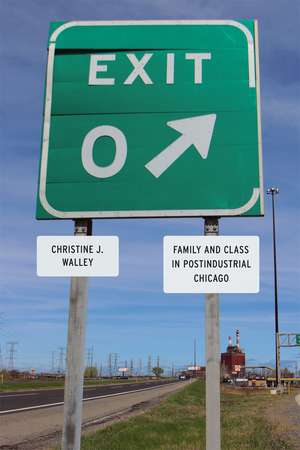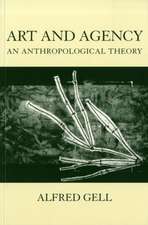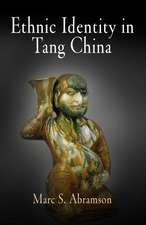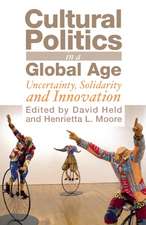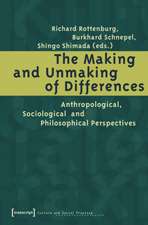Exit Zero: Family and Class in Postindustrial Chicago
Autor Christine J. Walleyen Limba Engleză Paperback – 17 ian 2013
Winner of CLR James Book Prize from the Working Class Studies Association and 2nd Place for the Victor Turner Prize in Ethnographic Writing.
In 1980, Christine J. Walley’s world was turned upside down when the steel mill in Southeast Chicago where her father worked abruptly closed. In the ensuing years, ninety thousand other area residents would also lose their jobs in the mills—just one example of the vast scale of deindustrialization occurring across the United States. The disruption of this event propelled Walley into a career as a cultural anthropologist, and now, in Exit Zero, she brings her anthropological perspective home, examining the fate of her family and that of blue-collar America at large.
In 1980, Christine J. Walley’s world was turned upside down when the steel mill in Southeast Chicago where her father worked abruptly closed. In the ensuing years, ninety thousand other area residents would also lose their jobs in the mills—just one example of the vast scale of deindustrialization occurring across the United States. The disruption of this event propelled Walley into a career as a cultural anthropologist, and now, in Exit Zero, she brings her anthropological perspective home, examining the fate of her family and that of blue-collar America at large.
Interweaving personal narratives and family photos with a nuanced assessment of the social impacts of deindustrialization, Exit Zero is one part memoir and one part ethnography— providing a much-needed female and familial perspective on cultures of labor and their decline. Through vivid accounts of her family’s struggles and her own upward mobility, Walley reveals the social landscapes of America’s industrial fallout, navigating complex tensions among class, labor, economy, and environment. Unsatisfied with the notion that her family’s turmoil was inevitable in the ever-forward progress of the United States, she provides a fresh and important counternarrative that gives a new voice to the many Americans whose distress resulting from deindustrialization has too often been ignored.
This book is part of a project that also includes a documentary film.
This book is part of a project that also includes a documentary film.
Preț: 249.40 lei
Nou
Puncte Express: 374
Preț estimativ în valută:
47.73€ • 49.31$ • 39.72£
47.73€ • 49.31$ • 39.72£
Carte tipărită la comandă
Livrare economică 25 martie-08 aprilie
Preluare comenzi: 021 569.72.76
Specificații
ISBN-13: 9780226871806
ISBN-10: 0226871800
Pagini: 240
Ilustrații: 1 color plate, 24 halftones, 1 line drawing
Dimensiuni: 152 x 229 x 18 mm
Greutate: 0.31 kg
Editura: University of Chicago Press
Colecția University of Chicago Press
ISBN-10: 0226871800
Pagini: 240
Ilustrații: 1 color plate, 24 halftones, 1 line drawing
Dimensiuni: 152 x 229 x 18 mm
Greutate: 0.31 kg
Editura: University of Chicago Press
Colecția University of Chicago Press
Notă biografică
Christine Walley is associate professor of anthropology at the Massachusetts Institute of Technology and the author of Rough Waters: Nature and Development in an East African Marine Park.
Cuprins
Preface
Acknowledgments
Map of Southeast Chicago
INTRODUCTION
ONE / A World of Iron and Steel: A Family Album
TWO / It All Came Tumbling Down: My Father and the Demise of Chicago’s Steel Industry
THREE / Places Beyond
FOUR / The Ties That Bind
CONCLUSION / From the Grave to the Cradle
Notes
Bibliography
Index
Acknowledgments
Map of Southeast Chicago
INTRODUCTION
ONE / A World of Iron and Steel: A Family Album
TWO / It All Came Tumbling Down: My Father and the Demise of Chicago’s Steel Industry
THREE / Places Beyond
FOUR / The Ties That Bind
CONCLUSION / From the Grave to the Cradle
Notes
Bibliography
Index
Recenzii
“Walley . . . writes her book as an autoethnography. This is a form that uses the author’s personal experience and reflection as a lens through which to view broader cultural and political trends. It proves to be an effective way of tackling a number of thorny issues like the politics of industrial decline, gender roles in working-class families, racism in white blue collar neighborhoods and the physical and psychic markers of class in America with both clarifying insight and humanizing compassion. Walley’s willingness to dive headfirst into questions about the nature of persistent economic segregation seems especially necessary in today’s post-Occupy environment where issues of inequality are understood to be important yet still seem unable to be truly addressed.”
“How a person feels about herself, as she contemplates her class positioning, is central to Exit Zero, Christine Walley’s superb memoir or ‘autoethnography.’ . . . But there is more here than family history: Walley uses the stories of these people to reflect more generally on the kinds of stories people of the United States tell to make sense of social class and, particularly, of industrial progress and deindustrialization.”
“Exit Zero is a poignant and scholarly engagement with the topics of class and mobility. It offers an accessible entry point for undergraduates and an ideal model of reflexive methodology for advanced readers. It pushes us to ponder fundamental questions about family, national myths, and the end-goal of upward mobility.”
“Exit Zero is a remarkable, erudite book that is gracefully written and deeply grounded in cross-disciplinary scholarship on deindustrialization, inequality, gender, race, and class.”
“In the early years of Working-Class Studies, I worried that we sometimes valorized the personal without demanding that it generate political and scholarly analysis. With Walley’s book, we see that this field has developed a signature genre: the hybrid of autobiography and scholarly analysis previously illustrated most effectively by Jack Metzgar in Striking Steel and Barbara Jensen in Reading Classes. Such books go beyond telling working-class stories to demonstrate the critical practice of constructing theories of class through the analysis of experience. Exit Zero offers us both an engaging story and insightful analysis.”
“Exit Zero is an incredibly moving book written by an academic scholar coming to grips with her experience with deindustrialization.”
“Christine J. Walley’s vivid, frank, and insightful autoethnography casts a stark light on the travails of the American working class in the last century. In Exit Zero, she evokes the long hours and dangerous conditions of Chicago’s steel mills in their glory days, the heedless dumping of toxic waste that may have made Walley a cancer victim in her twenties, and the terrible toll the mills’ closing took on middle-aged men who would never work again. Progressive, but never politically correct, Walley gives a warts-and-all portrayal of Chicago’s white working class that does not smooth over its racist and sexist underside, while challenging middle-class readers to cast aside their own romanticized or paternalistic stereotypes of the declining white working class.”
“Exit Zero is a gem that will appeal to a variety of audiences. Christine Walley’s analysis of how community residents in Southeast Chicago—and particularly members of her family—experienced deindustrialization is sensitive and illuminating, and her discussion of what it was like for her to leave Southeast Chicago to enter the upper-middle class world reinforces her message that the working class world is poorly understood both in popular culture and in mainstream academic literature. In the last full chapter, on the environmental dimension of social class, she breaks new ground. Exit Zero is an intense account of a little-considered part of the American experience.”
“If you thought deindustrialization was something that decimated a few unlucky manufacturing towns back in the 1980s, think again. Christine J. Walley’s poignant analytic memoir of family life and class relations after the steel mills closed shows how America is still living out the legacy of those years, decades later. Anyone who wants to understand why the gap between rich and poor keeps widening, why upward mobility has shifted from a collective to an individual project, which misbegotten policies led to this predicament, and how ‘the materiality of class’ affects us even at the cellular level, can learn from Walley’s wise and incisive critique.”
“Telling the story of how the demise and collapse of the Southeast Chicago steel industry in the 1980s transformed her family’s sense of past and future, Christine J. Walley shows us that analyzing class, gender, and race always demands that we weave between the personal and the political, that we think across the intimate, the institutional, and even the international. Exit Zero is autoethnography, political economy, immigration history, and urban anthropology at its best.”
